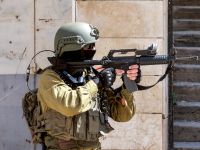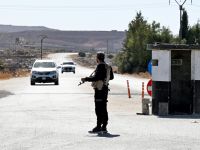The Israeli army tightened its grip on the Palestinian city of Ramallah on Wednesday, killing at least five Palestinians as its biggest offensive in the West Bank and Gaza Strip in 35 years stormed on.
Almost 40 Palestinians died Tuesday, ahead of a US mission to halt the relentless bloodletting. With former US general Anthony Zinni due in the region Thursday, the Israeli army occupied most of Ramallah, the Palestinian Authority's major city.
On the diplomatic front, the United States late on Tuesday asked the U.N. Security Council to pass a resolution "affirming a vision" of a Palestinian state living side by side with Israel, with both within secure and recognized borders.
Ramallah
The deputy commander of Palestinian leader Yasser Arafat's Force 17 bodyguard in Ramallah was killed during a gun fight with Israeli troops in the centre of the city.
Abu Fadih, a Force 17 colonel, served as deputy to Mahmoud Damra. He was killed Wednesday near Marara place in the centre of the city, which was almost entirely occupied by Israeli forces on Tuesday.
An Israeli soldier was very critically injured in a shooting attack early Wednesday near Ramallah. Late Tuesday, three more Israelis, including a woman, were shot and wounded by Palestinian gunfire in on the edge of the West Bank, police said.
In Ramallah, where some 100 Israeli tanks stormed into the city at dawn Tuesday, clashes were taking place in a number of districts, including the Al-Amari refugee camp and the suburb of El-Bireh.
On Tuesday night, clashes were still taking place at the entrance of Qadura refugee camps, AFP reported.
Tanks were on virtually every street corner, and even close to the offices of Palestinian leader Yasser Arafat, who was told by Israel on Monday he was free to move inside the Palestinian territories.
Arafat
Palestinian leader Yasser Arafat dismissed as "insolent" the Israeli government's decision to allow him freedom of movement in the Palestinian territories, in a TV interview.
The decision "to allow me to leave Ramallah is insolent. As if I needed to wait for authorization," Arafat told the Qatari satellite television station Al-Jazeera. "This is contrary to international conventions and diplomatic norms," said Arafat. "What is needed is to lift the blockade imposed on our people, to halt the aggression, the oppression, the racism and the Nazism against our people," said Arafat.
U.N.
The U.N. Security Council approved a resolution Tuesday night endorsing a Palestinian state for the first time, supporting a U.S. measure that also calls for an immediate cease-fire in the escalating 18-month Israeli-Palestinian conflict.
The resolution, the first the United States has introduced since the latest bloodshed began in September 2000, was introduced hours after Syria tabled a Palestinian-backed resolution. It won support from 14 of the 15 council members, with Syria abstaining, AP.
Speaking on behalf of Arab nations, Syria's U.N. Ambassador Mikhail Wehbe said the resolution was "very weak" and didn't deal with the roots of the Israeli-Palestinian conflict, "the question of the Israeli occupation."
Syria abstained, rather that voting against the resolution, "to send a message" and not break the unity of the council, Wehbe said.
U.S. Ambassador John Negroponte countered it "is a strong resolution on the Middle East," capturing a broad consensus on the goals and next steps in the peace process and speaking out strongly against terrorism. "Our intent in doing this was to give an impulse to peace efforts and to decry violence and terror," he said after the vote.
Nasser Al-Kidwa, the Palestinian U.N. observer, described the resolution as important and welcomed the council's first reference to two states, Israel and Palestine, living side by side. He indicated if he had a vote he would have approved it. (Albawaba.com)
© 2002 Al Bawaba (www.albawaba.com)







